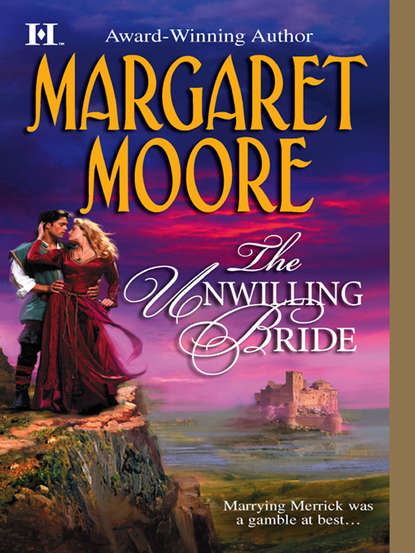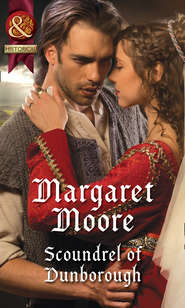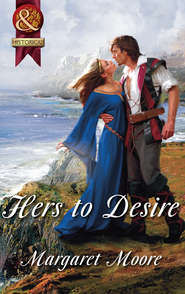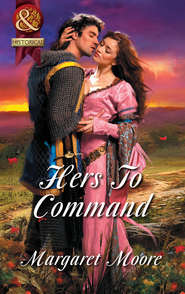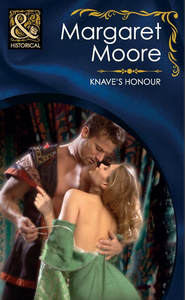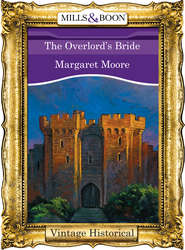По всем вопросам обращайтесь на: info@litportal.ru
(©) 2003-2024.
✖
The Unwilling Bride
Автор
Год написания книги
2018
Настройки чтения
Размер шрифта
Высота строк
Поля
As Constance and Alan exchanged shocked and dismayed looks, Beatrice frowned, her enthusiasm somewhat dimmed. “What’s wrong?”
How was she going to tell Beatrice the reason for their horror at this news? Her cousin wasn’t ignorant of some of Wicked William’s abuses; nobody who lived within fifty miles of Tregellas could be. But she’d always tried to shield Beatrice from the worst.
“I’m sure he’ll pick you for the Queen of the May, Constance,” Beatrice ventured, as if Constance’s silence was based on a worry far different from the one she was actually experiencing. “After all, he’s going to marry you.”
“It’s not that,” Constance replied. She searched for an explanation that wouldn’t require her to go into sickening detail. “Being a new-made lord, Merrick probably doesn’t appreciate all the complications that may arise from such events. I shall have to enlighten him. Right away. Good day, Alan. Until later, Beatrice,” she finished as she hurried to the door.
She carried on quickly through the kitchen, nodding briefly to Gaston and the busy servants, then through the corridor to the hall, where she looked for Merrick. At least—since she wanted him to hate her—she need not couch her words with care. That held some danger, too, but she was on her guard now. Just let him try to kiss her!
Servants trimmed the torches and added wood to the hearth. Sir Henry and Sir Ranulf were playing chess, Sir Ranulf studying the board with care while Sir Henry laughed and said something about making a move before night fell. The uncles, deep in discussion, sat near the central hearth.
Merrick wasn’t there.
She didn’t want to ask anyone where Merrick was; Lord Algernon would smirk as he had lately taken to doing, her uncle would ask her why she wanted to know, and his friends would regard her with that unnerving curiosity.
The bailiff came scuttling down the steps from the solar. He looked even more pale than usual and licked his lips as if he wanted a drink.
“Ruan!”
He checked his steps and then, smiling in that obsequious way that he had, rushed toward her.
Everything about the man reminded her of a crawling, slimy thing—his pale skin, as if he’d just climbed out from under a rotting piece of wood; the way he stood with his head thrust forward as if he was either about to bow or just rising from one; his clasped hands that would have done credit to a shy maiden; the pleading tone of his voice, as if every utterance was made with regret and against his better judgment; and especially the shrewd gleam in his watery blue eyes that, in spite of his posture and manner, betrayed a clever and, she was sure, devious mind. “Is Lord Merrick in his solar?”
“Yes, my lady.”
“Has he told you of his plans for May Day?”
Ruan’s eyes shone with curiosity. “Yes, my lady. Didn’t he tell you?”
A blush heated her face. “How do you think the villagers will take the news?” she asked, not answering his question.
Ruan frowned and ran his hand over his moist lips. “I think they’ll be wondering if they’ve got to hide farther back in the woods when he chooses the Queen of the May.”
That was what Constance was thinking, too.
“I’m sure he’ll want to please you, my lady,” Ruan said quietly, and in a way that seemed to imply all manner of unsavory things. “If you tell him—”
“Good day, Ruan,” she interrupted, turning toward the stairs to the solar.
“Good day, my lady,” he muttered under his breath as he watched the beautiful, haughty lady hurry on her way.
They thought themselves so fine and clever, all these lords and ladies.
Well, he was clever, too.
CONSTANCE RAPPED SHARPLY on the heavy wooden door to the solar, then entered without waiting for Merrick to answer. “I understand you have made certain plans for May Day.”
The lord of Tregellas sat at the trestle table, which was now covered with scrolls. As the wind howled outside the walls, the tapestries swayed in the draught that made its way through the linen shutters that couldn’t keep out the rain. Droplets ran along a jagged path across the sill, then trickled down the wall to puddle on the floor.
“I have,” he said gruffly as he raised his head to look at her. The flame of the plump tallow candle on the table flickered, altering the shadows on his face. The planes of his cheeks. His brown eyes, so dark they were nearly black.
She took a step back, then berated herself for acting like an addlepated ninny. The lord of Tregellas was, after all, just a man.
He gestured at the stool in front of the table that Ruan had likely just vacated. “Will you sit, my lady?”
This might take some time, so perhaps she should. As gracefully as she could, Constance lowered herself onto the stool and arranged her skirts. “You should have consulted with Alan de Vern or me.”
His hands resting on the table before him, Merrick leaned back in his chair and regarded her steadily. “Why? I remembered such activities from my boyhood here and assumed they still continued.”
“There have been some changes since your boyhood, my lord.”
He ran a swift gaze over her. “Yes, so I’ve noticed.”
She frowned. “My lord, this is a very serious matter, and you’d do well to listen to me.”
Furrows of concern appeared between his brows. “Very well, my lady. Explain what has changed.”
How could she possibly make him understand? she wondered as a blast of wind sent another barrage of rain against the tower walls. The tapestry nearest her billowed, as if someone was hiding behind it, although that was impossible. There was no room; she’d supervised the hanging of it herself.
Nevertheless, she shivered and wrapped her arms about herself as she began to explain why there should be no competition between the villagers and the garrison, and especially why he should have nothing whatsoever to do with the Queen of the May. “The men of the garrison are hardened soldiers and they can be brutal when their blood is up. That may serve you well in battle, but can lead to trouble during such sport. The last time there was a foot ball game between the garrison and the villagers, the smith’s son was nearly killed by one of your father’s bodyguards.”
Merrick wordlessly rose and brought the brazier full of glowing coals closer to her chair. She was grateful for the added warmth, and as he moved, she tried not to notice the lithe, athletic grace of his actions, or the power of those broad shoulders and the arms that lifted the heavy iron brazier as easily as another man would a slender branch.
When he went to the small side table that bore a silver carafe of wine and some goblets, her gaze traveled to his equally powerful thighs encased in snug woolen breeches, and his muscular calves.
“Wine, my lady?”
Blushing like a silly girl caught ogling a soldier or servant, she looked quickly up at his face, then away to hide her foolish reaction. “No, thank you.”
He poured himself some wine before strolling back toward the table, bringing the goblet with him. “Such activity is good for my men. It encourages camaraderie between them, and given what I remember of the games in my boyhood, should ensure a healthy respect for the abilities of the villagers—whose blood, I believe, is just as swift to rise. I recall they were fierce competitors. Has that changed?”
She hesitated to answer, because he was right. If the young Eric hadn’t been so keen to get the inflated pig’s bladder through the sticks at the west end of the village, he wouldn’t have collided with that mercenary and subsequently been struck so hard that he’d been knocked cold.
“Well?” Merrick prompted.
“I think they will give your men a battle—which is just what I’m afraid of. This ‘sport’ could turn into a riot.”
“I won’t allow that to happen.”
If ever there was a man capable of holding off a riot single-handedly, she was looking at him. But she wouldn’t grant him that concession. “If you’re able.”
Merrick gave her the closest thing to a genuine smile she had yet seen. “I think between Henry, Ranulf and myself, we can control my men, especially if they’re tired from running after a ball. That’s another reason I would have the game. It will weary my men and prevent them from expending their energy in more harmful ways during the festivities.”
She hadn’t considered that. But she wasn’t willing to yield. “And it’ll make them thirsty, too. We could have a gang of drunken soldiers wreaking havoc in the village.”
“If that happens, they’ll be severely punished. I also intend to provide meat for the villagers’ feast, as well as ale. And I shall give my assurance that if any of my men cause serious harm or injury, or damage any property, the injured or aggrieved parties will be amply compensated.”
This was more generous than most lords, and far, far more generous than his father had ever been.





